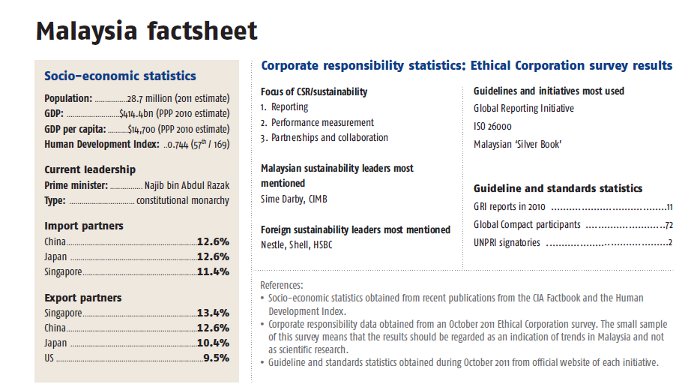Malaysia’s Islamic roots have helped grow a modern movement for sustainable business
Malaysia, a former British colony, is the third largest economy in the Association of South-east Asian Nations and the 29th largest in the world. Rapid industrialisation since the 1980s has transformed the country from being dependent on agriculture and mining to being a vibrant industrial economy. Nearly 1,000 companies are listed on the country’s stock exchange.
Malaysia aims to become a developed nation by 2020. The government wants sustainability and green technology to play an important part in achieving this goal, as envisaged in Malaysia’s 2020 Vision strategy.
The history of business ethics in Malaysia can be traced back to the emergence of Islamic banking in 1963. Malaysia is now the world’s third largest Islamic banking centre after Iran and Saudi Arabia. The Malaysian model of Islamic banking is considered one of the most advanced in the world.
The $1tn worldwide Islamic finance industry follows sharia principles, which encourage ethical investing. The principles, for example, prohibit Islamic banks from indulging in usury – the western system of charging interest is outlawed – and from investing in alcohol, gambling, pornography and other activities that Islam forbids.
Sustainability commentators in Malaysia emphasise that the principles of modern corporate social responsibility are very much in harmony with the Islamic principles of doing business.
Garment codes
The concept of corporate social responsibility in the modern sense first appeared in the garment industry in Malaysia, when a number of multinational retailers introduced supply chain codes of conduct in response to sweatshop allegations by human rights campaigners in the early 1990s.
Malaysia continues to be a key sourcing destination for multinational retail brands. The country exported $3bn worth of textile and clothing in 2010, up from $2.4bn in 1997, and the sector employs more than 48,000 workers.
Poor working conditions in garment factories in Malaysia still make occasional headlines. In a recent case, an Australian TV report accused Hytex Apparel, Asia’s largest shirt manufacturer and a Nike contractor, of poor conditions and unfair treatment of foreign workers. The exposéforced Nike to re-examine its policy on foreign workers in contract factories.
The chemical industry, which has a significant presence in Malaysia, was among the first sectors embracing corporate responsibility when the Chemical Industries Council of Malaysia adopted Responsible Care, a global safety, health and environmental initiative, in 1994. Having started with 33 signatories, the scheme is now endorsed by 104 chemical companies in Malaysia.
The timber industry was another sector that was an early focus of environmental concerns, due to the poor management of tropical forests in the region. The industry responded by setting up the Malaysian Timber Certification Council in 1998 to offer certified sustainable timber. The MTCC’s certification scheme, launched in 2001, has, however, come under criticism from international environmentalists, including Greenpeace, which has said the scheme does not prevent illegal timber from being certified.
Malaysian exports of timber products reached $6bn in 2008, and will rise to more than $16bn by 2020, according to the Malaysia Timber Industry Report by research firm Emerging Markets Direct.
One of the earliest corporate responsibility initiatives came from the controversial palm oil industry. The Roundtable on Sustainable Palm Oil (RSPO) was established in 2004 after three years of deliberations that were started by WWF and included industry players such as the Malaysian Palm Oil Association.
The international RSPO secretariat is located in Malaysia. The country accounts for 39% of world palm production and 44% of world exports, according to the Malaysian Palm Oil Council.
Government push
Corporate philanthropy has a long history in Malaysia. However, the real push for modern corporate social responsibility has come from the government. The government believes good corporate responsibility credentials can enhance the competitiveness of Malaysian companies.
In September 2006 the government introduced The Silver Book, a comprehensive social responsibility manual for “government linked companies”. Khazanah National, the government’s arm for managing state investments, is responsible for monitoring the implementation of the guidelines.
Almost simultaneously, the country’s stock exchange launched a framework for listed companies to report on corporate responsibility. The guidelines require all exchange-listed companies to produce an annual CR statement and disclose their activities.
The government’s initiatives were, however, preceded by an important event in 2004, which shaped government thinking. In 2004, the British high commission, working with Malaysia’s Securities Commission, organised the country’s first conference on corporate social responsibility.
In 2006, Malaysia also became the first country in south-east Asia to launch its own socially responsible investment index.
By 2008 the momentum was clear, when 10 Malaysian companies signed up to the United Nations Global Compact through the new Malaysian UNGC chapter. These included local subsidiaries of multinational companies such as Digi Communications, Talisman Energy and Philips Malaysia. UNGC Malaysia now has more than 70 signatories.

References:
Socio-economic statistics obtained from recent publications from the CIA Factbook and the Human Development Index.
Corporate responsibility data obtained from an October 2011 Ethical Corporation survey. The small sample of this survey means that the results should be regarded as an indication of trends in Malaysia and not as scientific research.
Guideline and standards statistics obtained during October 2011 from official website of each initiative.

